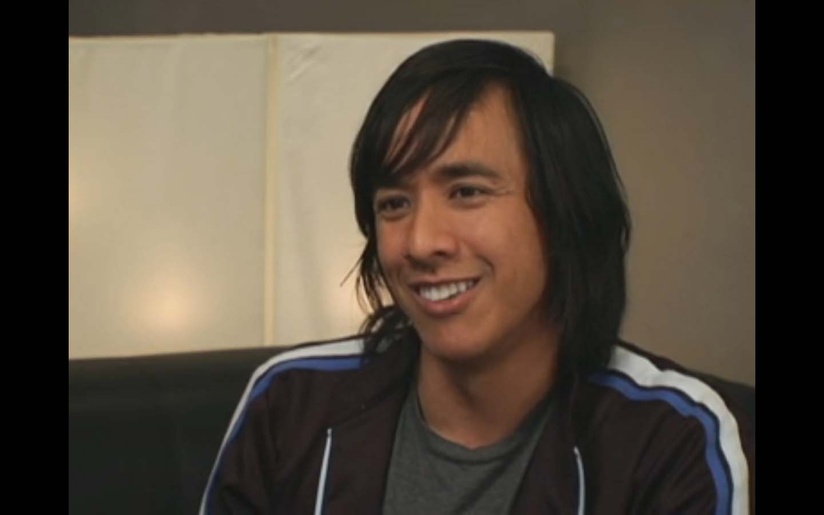Interview: Kip Fulbeck

|
||
| Licensing | ||
Kip Fulbeck was born in 1965 to a Chinese mother and English/Irish father.
This album introduces the following 19 clips from his interview on May 3, 2006 followed by his profile.
1. Early consciousness of identity
2. Finding parallels through art
3. Refusing to use a Chinese name to identify as Asian American
4. The Hapa Project
5. Perceptions of uniqueness
6. Defusing myths through The Hapa Project
7. Difficulty responding to the question “What are you?”
8. Lessons learned from The Hapa Project
9. Differing responses by gender to the Hapa Project
10. Identity as a conscious ongoing process
11. Japanese Americans are more aware of their Hapa identity
12. Hapa as his primary identity
13. Discomfort at being labeled by others
14. International dimensions of hapa identity
15. Issues of identity outside of America
16. Imposing identity upon others
17. Changing fortunes of “identity art”
18. The right to say who you are
19. Defining the term “Hapa”
* Original interview clips were posted in the Discover Nikkei Interviews section.
Slides in this album |
|

|
Early consciousness of identityI became conscious pretty early, because I grew up in Covina, about a half hour from here. And my family, besides my father who’s English/Irish descent from New York, my family is entirely Chinese, from China. My brother and my sisters are all full-blooded Chinese from China, as are all …
Kip Fulbeck Interview #1: Early consciousness of identity |

|
Finding parallels through artWell, I think any artist has the ego to think that what we’re doing is so important everyone else should listen to us. And there’s this thing of like, “Is your art self-indulgent?” But I always felt like the more personal I got with my own stories and the more …
Kip Fulbeck Interview #2: Finding parallels through art |

|
Refusing to use a Chinese name to identify as Asian AmericanI had hoped for one, that’s what I really wanted. And I think among those artists that I mentioned I have great respect for, were peers and colleagues and I feel great kinship with them because we all kind of struggled through the same things. At the same time I …
Kip Fulbeck Interview #3: Refusing to use a Chinese name to identify as Asian American |

|
The Hapa ProjectThe Hapa Project is an idea I came up with about 10 years ago of photographing people that may have gone through similar situations that I went through. And it was a project that I wanted to go about to see if I could try and find a place where …
Kip Fulbeck Interview #4: The Hapa Project |

|
Perceptions of uniquenessOne interesting story about the Hapa Project is that I would get people from very homogenous areas. I had a woman write me from Oklahoma who wrote me and said “You must fly out to Oklahoma to photograph me for this because you’ll never believe it, I’m black and Korean!” …
Kip Fulbeck Interview #5: Perceptions of uniqueness |

|
Defusing myths through The Hapa ProjectIt allows people to, hopefully, defuse some myths that may be about them. I think there’s these myths of “hybrid vigor” and “All you Hapas, you’re all beautiful, y’all have it going on, and everything’s great, and look at all the models out there and all the actors, and oh, …
Kip Fulbeck Interview #6: Defusing myths through The Hapa Project |

|
Difficulty responding to the question "What are you?"People come in—the pictures are usually pretty easy, people come in, they sit, I shoot five, ten, fifteen photographs, they look at ‘em, they pick one they like, and then I give them this piece of paper where they sit there with this 7-x-7 piece of paper and I’d give …
Kip Fulbeck Interview #7: Difficulty responding to the question "What are you?" |

|
Lessons learned from The Hapa ProjectThe overwhelming response has been really positive. That’s been great for me, but the important thing that I learned from it is that I’m as scared as anyone else to be around people that aren’t like me. I can’t name one of my friends that’s homophobic, I can’t name one …
Kip Fulbeck Interview #8: Lessons learned from The Hapa Project |

|
Differing responses by gender to the Hapa ProjectOne thing I found that was really interesting that I would not have guessed is if I photographed a thousand people, I’d say two-thirds to three-quarters were women. I would not have guessed that would have happened and I realized—it made me think a lot about why more women—and it’s …
Kip Fulbeck Interview #9: Differing responses by gender to the Hapa Project |

|
Identity as a conscious ongoing processI think my own identity changes whether I did the project or not. I think identity is a conscious ongoing process. We always redefine who we are, depending what we want to do consciously, and sometimes it’s unconscious, who we hang out with. I know that when I hang out …
Kip Fulbeck Interview #10: Identity as a conscious ongoing process |

|
Japanese Americans are more aware of their Hapa identityI was amazed at how many J-A Hapas participated, and certainly that’s the biggest number, but it’s also a group that is probably more aware of this, and because maybe perhaps more work has been done about it or more people are more conscious of it, they are more apt …
Kip Fulbeck Interview #11: Japanese Americans are more aware of their Hapa identity |

|
Hapa as his primary identityI was born in ’65, I was born two years before the laws went off the books about anti-miscegenation. I was 35 years old before the Census allowed me, for the first time, to check more than one box—that’s ridiculous! Every job application, every school questionnaire was always “pick one” …
Kip Fulbeck Interview #12: Hapa as his primary identity |

|
Discomfort at being labeled by othersI don’t really like other labels put on me. When you self-identify, that’s your choice, and that’s the great thing, if you want to identify as whatever it is you do…I mean, I remember I got a ticket the other day for having my dog on the beach and I …
Kip Fulbeck Interview #13: Discomfort at being labeled by others |

|
International dimensions of hapa identityEssentially it is an American phenomena, because we do talk about this more than anywhere else. To some extent there’s Singapore has a pretty good awareness, but it’s really a Eurasian sort of conversation happening there. It’s mostly Eurasian, they don’t have the sort of Afro-Asian, the Latinos and so …
Kip Fulbeck Interview #14: International dimensions of hapa identity |

|
Issues of identity outside of AmericaI haven’t shown them that much in other countries yet. I spent the summer living in Japan, living in Yokohama and so I did bring my portfolio with me and I showed them around there and people were fairly interested there because the outmarriage rate is starting to become bigger …
Kip Fulbeck Interview #15: Issues of identity outside of America |

|
Imposing identity upon othersCertainly if you go internationally, identity is placed upon you. For me, I grew up across the street here, I grew up being in Chinatown every week. At the same time I grew up with this really heavy J-A influence in my life from my brother doing shotokan and then …
Kip Fulbeck Interview #16: Imposing identity upon others |

|
Changing fortunes of "identity art"When I first came out, when I first came out doing it, again, it was hip in the art world to do identity studies in the early ‘90s. It was a big thing, and now it’s not as big a thing, in terms of what’s selling, in terms of the …
Kip Fulbeck Interview #17: Changing fortunes of "identity art" |

|
The right to say who you areAs long as people are active and adamant about saying that they have a right to say who they are, and that no one else gets to tell them who they are. That’s the really important thing. I think that’s—if I have a kid, that’s one thing I’d like to …
Kip Fulbeck Interview #18: The right to say who you are |

|
Defining the term "Hapa"“Hapa” is a Hawaiian word, literally meaning “half” or “portion” and it became popularized in the phrase “hapa haole,” people who were originally part Hawaiian and part Caucasian, “hapa haoles”. As Asians from the mainland started going over more and more it was brought back to the mainland. And it’s …
Kip Fulbeck Interview #19: Defining the term "Hapa" |

|
PROFILE: Kip FulbeckKip Fulbeck was born in 1965 to a Chinese mother and English/Irish father. At age five, he was told by his full-blooded Chinese cousins that he was Hapa. He never gave much thought to the term as a child. As he grew older, faced with the dearth of knowledge relating …
Kip Fulbeck |
 editor
editor
 Discover Nikkei Illustrations by Roxsy Lin
Discover Nikkei Illustrations by Roxsy Lin Nima-kai Traditions: Matsuri
Nima-kai Traditions: Matsuri Nima-kai Kodomo no Hi Traditions
Nima-kai Kodomo no Hi Traditions Nima-kai Hinamatsuri Traditions
Nima-kai Hinamatsuri Traditions Nima-kai Oshogatsu Traditions
Nima-kai Oshogatsu Traditions Nikkei Names: Writing Workshop in Gardena
Nikkei Names: Writing Workshop in Gardena Nikkei Names: Writing Workshop in Anaheim
Nikkei Names: Writing Workshop in Anaheim Nikkei Names: Writing Workshop in San Jose
Nikkei Names: Writing Workshop in San Jose Nikkei Names: Writing Workshop in Seattle
Nikkei Names: Writing Workshop in Seattle Nikkei Names: Writing Workshop in Burnaby, BC
Nikkei Names: Writing Workshop in Burnaby, BC
 Journal feed
Journal feed
